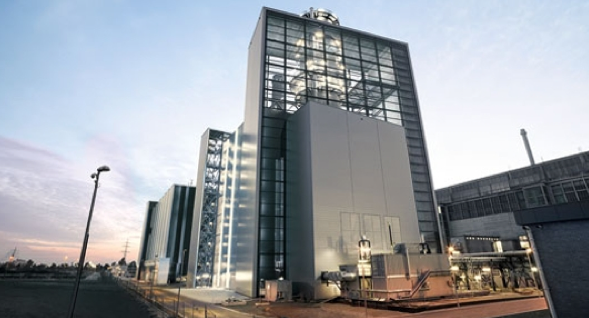Düsseldorf’s new combined cycle gas turbine (CCGT) power plant is the new world leader in net power-generating efficiency and electrical net output.

On January 22, 2016, the “Fortuna” CCGT power plant at the Lausward location in the port of Düsseldorf was successfully handed over to the customer and operator, the Stadtwerke Düsseldorf public utility company. The power plant has broken three world records:
1. In the acceptance test a maximum electrical net output of 603.8 MW was achieved, which is a new record for a combined cycle plant of this type in a single-shaft configuration.
2. A new world record of around 61.5 percent for net power-generating efficiency was also achieved, enabling Siemens to beat its own efficiency record of 60.75 percent set in May 2011 at the Ulrich Hartmann power plant located in Irsching in the south of Germany. The high efficiency level makes the power plant especially environmentally friendly.
3. In addition, “Fortuna” can also deliver up to around 300 MW for the district heating system of the city of Düsseldorf – a further international peak value for a power plant equipped with only one gas and steam turbine.
The heart of the “Fortuna” CCGT power plant is the extremely powerful SGT5-8000H gas turbine, supported by the SST5-5000 steam turbine and the SGEn-3000W generator.
Good business with efficiency
The increase in the capacity and efficiency levels is the result of consistent ongoing developments, for example in the design of components, in the materials used, in the overall construction of the plant, and in the perfect interworking of all plant components. “We optimized the power plant to enable it to be ideally positioned in one of the world's most demanding power markets. Together with the Stadtwerke Düsseldorf we are therefore very pleased that this plant has set the new efficiency world record,” stated Willi Meixner, CEO of the Power and Gas Division within Siemens AG.
Highly efficient and flexible CCGT power plants ideally complement renewable energy sources such as the wind and the sun, which are subject to fluctuations in their power outputs. This flexibility supports the operator in efforts to achieve economical operations in a challenging environment for conventional power plants. Meanwhile, the production of district heating boosts the plant’s fuel utilization up to 85 percent, while reducing CO2 emissions to a mere 230 grams per kilowatt-hour.
Excellent track record
“The electrical and fuel utilization efficiency of this power plant is exceptional,” says Udo Brockmeier, chairman of Stadtwerke Düsseldorf. “And it reaches full output in less than 25 minutes after powering on. Today, you can hardly imagine a more effective power plant to cover the needs and demands of our city. We are able to generate and provide a sustainable energy supply and district heating for Düsseldorf.” Thus, Stadtwerke Düsseldorf are making a valuable contribution to the city’s goal of becoming climate-neutral by 2050.
“Fortuna” was handed over to the customer 19 days ahead of the date set in the contract. The project on the bank of the Rhine was additionally a huge success with regard to occupational safety for everyone involved. More than two million hours of work in total were performed without a single accident.
Picture credits: Siemens AG
